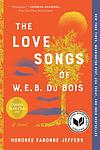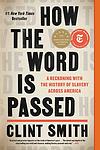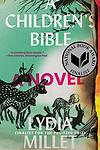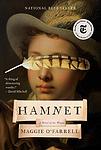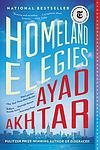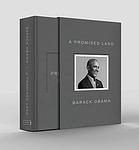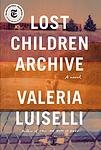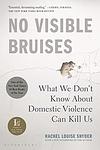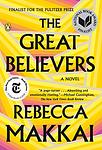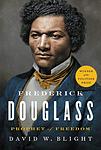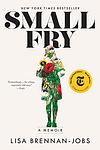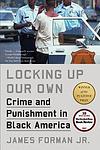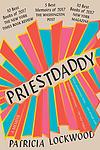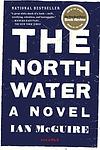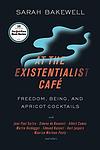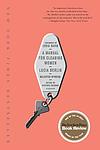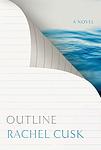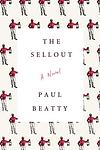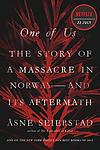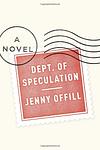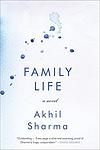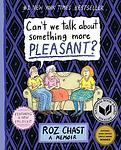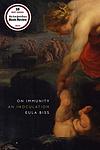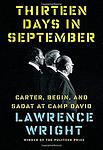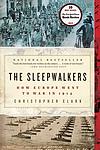The 10 Best Books Through Time
This is one of the 284 lists we use to generate our main The Greatest Books list.
-
The Candy House by Jennifer Egan
"The Candy House" is a short story by Jennifer Egan about a young girl named Sasha who becomes obsessed with a neighbor's house that is filled with candy. She begins to sneak into the house and steal candy, but soon discovers a dark secret about the owner. The story explores themes of temptation, morality, and the consequences of our actions.
-
Checkout 19 by Claire-Louise Bennett
"Checkout 19" is a collection of short stories by Claire-Louise Bennett that explore the intricacies of human relationships, particularly those between women. The stories are set in various locations, from a remote Irish village to a bustling city, and feature characters who are grappling with loneliness, desire, and the complexities of communication. Bennett's prose is lyrical and introspective, inviting readers to delve into the inner lives of her characters and contemplate the nature of human connection.
-
Demon Copperhead by Barbara Kingsolver
"Demon Copperhead" is a short story by Barbara Kingsolver about a young woman named Codi who returns to her small hometown in Arizona to care for her father, who is dying of Alzheimer's disease. As she reconnects with her past and the people in her community, Codi discovers a dark secret about her family's history and must come to terms with the truth. The story explores themes of family, identity, and the impact of the past on the present.
-
The Furrows by Namwali Serpell
"The Furrows" is a collection of short stories by Namwali Serpell that explore the complexities of human relationships and the impact of societal norms and expectations. Set in Zambia, the stories touch on themes of love, loss, identity, and power dynamics. From a young girl navigating her way through a new school to a woman struggling to come to terms with her mother's death, each story offers a unique perspective on the human experience. Serpell's writing is both lyrical and poignant, capturing the nuances of everyday life with sensitivity and insight.
-
Trust by Hernán Díaz
"Trust" by Hernán Díaz is a novel that follows the journey of a young man named Rafael, who leaves his home in Mexico to pursue the American Dream in the 19th century. Rafael's journey takes him through the Wild West, where he encounters a diverse cast of characters and faces numerous challenges. Along the way, he learns about the complexities of trust and betrayal, and ultimately discovers the true meaning of home and belonging. The novel is a poignant exploration of identity, immigration, and the American experience.
-
An Immense World by Ed Yong
"An Immense World" is a collection of science essays written by Ed Yong, a science journalist. The book explores a wide range of scientific topics, from the behavior of animals to the complexities of the human microbiome. Yong's writing is accessible and engaging, making complex scientific concepts easy to understand for readers of all backgrounds. The essays are thought-provoking and provide a glimpse into the fascinating world of science. Overall, "An Immense World" is a must-read for anyone interested in science and the natural world.
-
Stay True by Hua Hsu
"Stay True" by Hua Hsu is a collection of essays that explore the intersections of race, culture, and identity in America. Through personal anecdotes and cultural analysis, Hsu examines the ways in which popular culture and media shape our understanding of race and identity, and how individuals navigate these complex and often contradictory narratives. From the rise of Asian American representation in Hollywood to the legacy of Michael Jackson, "Stay True" offers a nuanced and thought-provoking exploration of the cultural landscape of America.
-
Strangers To Ourselves by Rachel Aviv
"Strangers to Ourselves" is a collection of essays by Rachel Aviv that explores the complexities of the human mind and the ways in which our inner lives can be both mysterious and revealing. From a man who believes he is a tiger to a woman who has lost the ability to recognize faces, Aviv delves into the world of psychology and neuroscience to uncover the secrets of the human psyche. Through vivid storytelling and in-depth research, she sheds light on the many ways in which our brains can deceive us and the profound impact that mental illness can have on our lives.
-
Under The Skin by Linda Villarosa
"Under The Skin" by Linda Villarosa is a memoir about the author's journey to understand and accept her identity as a black lesbian. Villarosa recounts her experiences growing up in a predominantly white community, struggling with her sexuality, and navigating the complexities of race and gender in America. She also explores the intersection of HIV/AIDS and the black community, as well as her own personal battle with the disease. Through her candid and poignant storytelling, Villarosa sheds light on the importance of self-acceptance and the power of community in overcoming adversity.
-
We Don’t Know Ourselves by Fintan O'Toole
"We Don't Know Ourselves" by Fintan O'Toole is a collection of essays that explores the current state of Ireland and its people. O'Toole argues that Ireland's sense of identity has been shaped by its history of colonization and the struggle for independence, but that this identity is now being challenged by globalization and the changing social and economic landscape. He examines issues such as immigration, the Catholic Church's declining influence, and the rise of nationalism, and ultimately argues that Ireland needs to embrace a new sense of identity that is inclusive and forward-thinking.
-
How Beautiful We Were by Imbolo Mbue
"How Beautiful We Were" is a novel set in a fictional African village called Kosawa, where the people are suffering from the devastating effects of an American oil company's presence. The story is told through the eyes of a young girl named Thula, who grows up to become a revolutionary leader fighting for justice for her people. The novel explores themes of environmental destruction, corruption, and the power of community and resistance. It is a powerful and moving story that sheds light on the ongoing struggles faced by many communities in the Global South.
-
Intimacies by Katie Kitamura
"Intimacies" by Katie Kitamura is a novel that follows an interpreter named Ana as she navigates her personal and professional life in The Hague. Ana becomes involved with a married man, explores her own desires and boundaries, and grapples with the complexities of language and communication. Along the way, she becomes entangled in a high-profile case involving a war criminal, forcing her to confront the moral implications of her work and her own actions. The book explores themes of intimacy, power, and morality, and raises questions about the nature of relationships and the limits of human connection.
-
The Love Songs Of W.E.B. Dubois by Honorée Fanonne Jeffers
"The Love Songs of W.E.B. Du Bois" is a multi-generational family saga that explores the complexities of race, identity, and history through the experiences of Ailey Pearl Garfield. As a young woman, Ailey is haunted by the legacy of her family's slave-owning past and struggles to reconcile her own sense of self with the expectations of her community. Along the way, she uncovers the stories of her ancestors, including the famed civil rights leader W.E.B. Du Bois, and grapples with the enduring impact of racism in America. With lyrical prose and a rich cast of characters, Honoree Fanonne Jeffers' novel is a powerful meditation on the enduring power of love and the search for belonging in a divided world.
-
No One Is Talking About This by Patricia Lockwood
"No One Is Talking About This" by Patricia Lockwood is a novel that explores the intersection of the digital world and real life. The protagonist is a social media influencer who becomes obsessed with the internet and its ability to connect people. However, her world is turned upside down when she receives news of a family member's serious illness, forcing her to confront the limitations of technology and the importance of human connection. The novel is a poignant reflection on the impact of social media on our lives and the need for authentic relationships in a world that is increasingly digital.
-
When We Cease To Understand The World by Adrian Nathan West, Benjamin Labatut
"When We Cease To Understand The World" is a collection of two novellas that explore the limits of human knowledge and the consequences of scientific discovery. In "The Immaculate Void," a mathematician becomes obsessed with solving a seemingly unsolvable equation and risks his sanity in the process. In "The Unfinished," a group of scientists race to unlock the secrets of nuclear fission, only to realize the devastating power they have unleashed. Through these stories, the authors question the role of science in society and the dangers of pursuing knowledge without considering its ethical implications.
-
The Copenhagen Trilogy: Childhood; Youth; Dependency by Tove Irma Margit Ditlevsen, Tiina Nunnally, Michael Favala Goldman
"The Copenhagen Trilogy" is a collection of three autobiographical novels by Tove Ditlevsen, chronicling her life from childhood to adulthood in Copenhagen. The first book, "Childhood," explores Ditlevsen's difficult upbringing in a working-class family, while "Youth" delves into her teenage years and early adulthood, including her struggles with addiction and mental illness. The final book, "Dependency," examines Ditlevsen's relationships and her battle with addiction, culminating in her eventual recovery. Through her candid and introspective writing, Ditlevsen offers a poignant and powerful portrayal of the human experience.
-
How The Word Is Passed: A Reckoning With The History Of Slavery Across America by Clint Smith
"How The Word Is Passed" is a powerful and thought-provoking exploration of the legacy of slavery in America. Through a series of vivid and evocative essays, author Clint Smith takes readers on a journey across the United States, visiting sites that are deeply connected to the history of slavery and its aftermath. From Monticello to Angola Prison, Smith offers a nuanced and insightful look at the ways in which slavery has shaped our country and continues to impact our lives today. With a clear-eyed and compassionate approach, "How The Word Is Passed" is a must-read for anyone interested in understanding the complex and ongoing legacy of slavery in America.
-
Invisible Child: Poverty, Survival And Hope In An American City by Andrea Elliott
"Invisible Child" is a non-fiction book by journalist Andrea Elliott that tells the story of Dasani, a young girl living in poverty in New York City. The book follows Dasani and her family as they struggle to survive in a city that seems to have forgotten them. Despite the challenges they face, the family never loses hope, and their resilience and determination are a testament to the power of the human spirit. Through Dasani's story, Elliott sheds light on the systemic issues that perpetuate poverty in America and the urgent need for change.
-
On Juneteenth by Annette Gordon-Reed
"On Juneteenth" is a memoir by Pulitzer Prize-winning author Annette Gordon-Reed that explores the history and significance of Juneteenth, the holiday commemorating the end of slavery in the United States. Gordon-Reed reflects on her own experiences growing up in Texas and the ways in which Juneteenth has been celebrated and politicized over time. She also delves into the complex legacy of slavery and racism in America, offering a powerful and thought-provoking exploration of this important holiday and its ongoing relevance.
-
Red Comet: The Short Life And Blazing Art Of Sylvia Plath by Heather L. Clark
"Red Comet" is a comprehensive biography of Sylvia Plath, one of the most iconic poets of the 20th century. The book covers her life from her childhood in Massachusetts to her tragic suicide at the age of 30, exploring her relationships, her struggles with mental illness, and her groundbreaking work in poetry and prose. Through meticulous research and interviews with those who knew Plath, author Heather L. Clark offers a nuanced and illuminating portrait of a complex and brilliant artist.
-
A Children’s Bible by Xe Sands, Lydia Millet
"A Children's Bible" follows a group of children and their parents who are spending the summer in a rented house in the countryside. As the parents indulge in drinking and infidelity, the children are left to their own devices and begin to explore the surrounding wilderness. When a severe storm hits and the world as they know it begins to crumble, the children turn to their own imaginations and a battered old Bible for guidance. The novel is a poignant commentary on climate change, societal decay, and the resilience of youth.
-
Deacon King Kong by James McBride
"Deacon King Kong" by James McBride is a novel set in 1969 Brooklyn, where a drunken Deacon Sportcoat shoots a drug dealer named Deems Clemens in the courtyard of the Cause Houses housing project. The shooting sets off a chain of events that brings together a cast of characters from the neighborhood, including a young drug dealer, a church-going widow, a corrupt cop, and a group of elderly church women. Through their perspectives, McBride explores themes of race, religion, and community in a vibrant and humorous tale.
-
Hamnet by Maggie O'Farrell
"Hamnet" is a deeply moving and beautifully written historical novel that reimagines the life of a young boy, Hamnet, who is the son of a glovemaker in Stratford-upon-Avon. The boy tragically dies at the age of 11, which leaves a profound impact on his family, particularly his father, who is inspired to write one of the world's most famous plays. The narrative alternates between the time leading up to Hamnet's death and the aftermath, providing an intimate portrait of grief, love, and the power of art.
-
Homeland Elegies by Ayad Akhtar
"Homeland Elegies" is a novel by Ayad Akhtar that blurs the lines between fiction and memoir. The book follows the story of a Pakistani-American playwright named Ayad Akhtar who is struggling to reconcile his identity as a Muslim-American in a post-9/11 world. Through a series of interconnected stories, Akhtar explores themes of family, politics, and identity, while also examining the American Dream and the challenges faced by immigrants in the United States. The novel is a powerful and poignant exploration of what it means to be an American today.
-
The Vanishing Half by Brit Bennett
"The Vanishing Half" by Brit Bennett is a novel that tells the story of twin sisters, Desiree and Stella, who grow up in a small, southern black community in the 1950s and 60s. After running away from home at the age of 16, Stella decides to pass as white and marries a wealthy white man, while Desiree returns to their hometown with her dark-skinned daughter. The novel explores themes of identity, race, family, and the consequences of choices made in the past. As the sisters' lives diverge, their daughters' paths cross, and secrets are revealed, ultimately leading to a powerful and emotional conclusion.
-
Hidden Valley Road by Robert Kolker
"Hidden Valley Road" by Robert Kolker is a non-fiction book that tells the story of the Galvin family, who had 12 children, six of whom were diagnosed with schizophrenia. The book delves into the family's struggles with mental illness, the medical community's understanding of schizophrenia at the time, and the impact the family's situation had on each member. It also explores the history of schizophrenia research and treatments, as well as the Galvin family's contribution to advancing our understanding of the disease.
-
A Promised Land by Barack Obama
"A Promised Land" is a memoir by Barack Obama, the 44th President of the United States. The book covers his early life, his political career, and his presidency. Obama reflects on his successes and failures, his relationships with world leaders, and the challenges he faced during his two terms in office. He also shares personal anecdotes about his family and the toll that public life took on them. Overall, "A Promised Land" is a thoughtful and introspective look at Obama's life and presidency.
-
Shakespeare In A Divided America by James Shapiro
"Shakespeare In A Divided America" by James Shapiro explores the role of Shakespeare in American history and culture, particularly during times of political and social division. From the Civil War to the present day, Shapiro examines how Shakespeare's plays have been used to both unite and divide Americans, reflecting the country's ever-changing values and beliefs. Through interviews with actors, directors, and scholars, as well as analysis of performances and adaptations, Shapiro offers a fascinating look at the enduring power of Shakespeare in America.
-
Uncanny Valley by Anna Wiener
"Uncanny Valley" is a memoir by Anna Wiener, detailing her experiences working in the tech industry during the height of Silicon Valley's boom. Wiener recounts her journey from a low-level publishing job in New York to a well-paid position at a data analytics startup in San Francisco. Along the way, she grapples with the ethical implications of the industry's obsession with data collection and the lack of diversity and accountability in tech culture. Wiener's book offers a critical perspective on the tech industry's impact on society and the personal toll it takes on those who work within it.
-
War by Margaret MacMillan
"War" by Margaret MacMillan is a comprehensive analysis of the causes, conduct, and consequences of war throughout history. Drawing on a vast range of sources, including personal accounts, political documents, and military strategy, MacMillan explores the human motivations behind war and the complex web of political, economic, and social factors that drive nations to conflict. She examines the impact of war on individuals and societies, from the trauma of soldiers on the front lines to the far-reaching political and economic consequences of global conflicts. Ultimately, MacMillan argues that war is a deeply human phenomenon, shaped by the complex interplay of individual and collective desires, fears, and ambitions.
-
Disappearing Earth by Julia Phillips
"Disappearing Earth" is a novel by Julia Phillips that explores the interconnected lives of the residents of a remote Russian peninsula after the disappearance of two young girls. Each chapter follows a different character as they grapple with their own personal struggles and the impact of the girls' disappearance on their community. Through vivid descriptions of the harsh landscape and the characters' complex relationships, Phillips weaves a gripping tale of loss, grief, and the enduring power of human connection.
-
The Topeka School by Ben Lerner
"The Topeka School" by Ben Lerner is a novel that explores the lives of a family in the Midwest during the 1990s. The story centers around Adam, a high school senior who is a talented debater and his parents, both psychologists. The book delves into the complexities of family dynamics, masculinity, and the power of language. It also touches on the rise of toxic masculinity and the political climate of the time. Through multiple perspectives and timelines, "The Topeka School" offers a unique and thought-provoking commentary on American culture and society.
-
Exhalation by Ted Chiang
"Exhalation" is a collection of nine science fiction short stories by Ted Chiang that explore various themes such as free will, determinism, artificial intelligence, and the nature of consciousness. Each story presents a unique and thought-provoking concept that challenges the reader's understanding of the world and human existence. The stories range from a society that communicates through scent to a scientist who discovers the secret of time travel. Chiang's writing is insightful, imaginative, and philosophical, making "Exhalation" a must-read for fans of science fiction and speculative fiction.
-
Lost Children Archive by Valeria Luiselli
"Lost Children Archive" by Valeria Luiselli is a novel that follows a family on a road trip from New York to Arizona. The parents are documentarians and are working on separate projects, while the children are preoccupied with their own interests. As they travel, the family becomes increasingly aware of the migrant crisis and the children's obsession with finding lost things takes on a new meaning. The novel explores themes of family, identity, and the power of storytelling.
-
Night Boat To Tangier by Kevin Barry
"Night Boat To Tangier" by Kevin Barry is a darkly comedic novel that follows two aging Irish gangsters, Charlie Redmond and Maurice Hearne, as they wait in a Spanish port for a ferry that may bring Maurice's estranged daughter back into his life. As they reminisce about their past and contemplate their future, the two men confront their regrets, failures, and the toll that a life of crime has taken on them. With poetic language and a keen eye for detail, Barry explores themes of love, loss, and the human condition in a story that is both haunting and humorous.
-
Say Nothing by Patrick Radden Keefe
This book is a gripping exploration of the Troubles in Northern Ireland, focusing on the disappearance of Jean McConville, a mother of ten who was abducted by the Irish Republican Army (IRA) in 1972. The narrative weaves together the stories of several key figures in the IRA, including Dolours Price, an IRA member who became disillusioned with the organization, and Brendan Hughes, a former IRA commander. The book delves deep into the political and personal complexities of the conflict, revealing the long-lasting trauma and moral ambiguities that continue to haunt those involved.
-
The Club by Leo Damrosch
"The Club" by Leo Damrosch is a non-fiction book that explores the lives and friendships of a group of influential men in 18th century England known as the "The Club". The members of this group included notable figures such as Samuel Johnson, Edmund Burke, and Joshua Reynolds. Through their meetings and discussions, they shaped the intellectual and cultural landscape of their time, and their legacy continues to influence modern society. The book provides a fascinating insight into the lives of these men and the impact they had on the world around them.
-
The Yellow House by Sarah M. Broom
"The Yellow House" is a memoir that tells the story of a hundred years of the author's family and their relationship to home in a neglected area of one of America's most mythologized cities, New Orleans. The narrative follows the author's journey from growing up in the titular house in New Orleans East, a largely ignored part of the city, to her pursuit of education and a career as a journalist, and her eventual return to New Orleans after Hurricane Katrina. The book explores themes of race, poverty, and inequity in America, while also being a deeply personal exploration of family, identity, and place.
-
No Visible Bruises by Rachel Louise Snyder
"No Visible Bruises" by Rachel Louise Snyder is a powerful and eye-opening book that explores the issue of domestic violence. Through a combination of personal stories, statistics, and research, Snyder reveals the devastating impact of domestic violence on individuals, families, and society as a whole. She also highlights the flaws in the criminal justice system and the societal attitudes that perpetuate this cycle of violence. This book is a must-read for anyone who wants to understand the complex and urgent issue of domestic violence and work towards creating a safer and more just society.
-
Midnight In Chernobyl by Adam Higginbotham
"Midnight In Chernobyl" is a non-fiction book that tells the story of the 1986 Chernobyl nuclear disaster. The book provides a detailed account of the events leading up to the explosion, the immediate aftermath, and the long-term effects of the disaster. It also explores the political and social context of Soviet Ukraine at the time, and the impact that the disaster had on the country and the world. The book draws on interviews with survivors, officials, and experts, as well as archival documents and scientific research, to provide a comprehensive and compelling narrative of one of the worst nuclear accidents in history.
-
Asymmetry by Lisa Halliday
This novel consists of two seemingly unrelated sections. The first part is a love story between a young American editor and a much older, famous writer. The second part is about an Iraqi-American economist detained by immigration officers in London. The two narratives converge in a surprising way, exploring themes of power imbalances, injustice, and the complexity of human relationships.
-
The Great Believers by Rebecca Makkai
"The Great Believers" by Rebecca Makkai is a powerful novel that tells the story of two interconnected groups of people: a group of gay men in 1980s Chicago during the height of the AIDS epidemic, and a woman in 2015 who is searching for her estranged daughter in Paris. The novel explores themes of love, loss, friendship, and the devastating impact of the AIDS crisis. Makkai's writing is both heartbreaking and hopeful, and she skillfully weaves together the two timelines to create a poignant and unforgettable story.
-
The Perfect Nanny by Leïla Slimani
"The Perfect Nanny" by Leïla Slimani is a psychological thriller that explores the relationship between a wealthy Parisian family and their nanny, Louise. The novel begins with the murder of the two children in the family by Louise, who had been their caregiver for several years. The story then delves into the events leading up to the tragic incident, revealing the complex dynamics between the family and Louise. Slimani's novel is a chilling portrayal of the blurred lines between love and obsession, and the dangers that can arise when those lines are crossed.
-
There There by Tommy Orange
"There There" by Tommy Orange is a powerful and poignant novel that follows the lives of twelve Native American characters living in Oakland, California. As their stories intertwine and converge, the novel explores themes of identity, community, and the effects of historical trauma on Native American people. Through vivid and lyrical prose, Orange gives voice to a group of individuals who have long been marginalized and overlooked in American society, creating a compelling and unforgettable portrait of contemporary Native American life.
-
Washington Black by Esi Edugyan
"Washington Black" is a historical novel by Esi Edugyan that tells the story of a young slave named George Washington Black, who is forced to flee a plantation in Barbados with the help of his master's brother. The two embark on a journey that takes them across the globe, from the Caribbean to the Arctic, and Washington Black discovers his talent for scientific illustration. Along the way, he faces challenges and struggles with his identity as a black man in a world dominated by white men. The novel explores themes of freedom, identity, and the impact of colonialism on individuals and societies.
-
American Prison: A Reporter's Undercover Journey Into The Business Of Punishment by Shane Bauer
In "American Prison: A Reporter's Undercover Journey Into The Business Of Punishment," Shane Bauer goes undercover as a correctional officer at a private prison in Louisiana to expose the inhumane conditions and profit-driven motives of the American prison system. Through his experiences, Bauer reveals the corrupt and exploitative nature of the for-profit prison industry, as well as the systemic racism and abuse of power that permeates the entire criminal justice system.
-
Educated by Tara Westover
In this memoir, a young woman recounts her journey from a sheltered and abusive childhood in a strict and isolated Idaho family to her pursuit of knowledge and education. Despite facing numerous obstacles, including her family's distrust of formal education, Tara Westover manages to escape her oppressive upbringing and eventually earns a PhD from Cambridge University. Through her compelling and thought-provoking narrative, she explores themes of identity, family, and the transformative power of education.
-
Frederick Douglass: Prophet of Freedom by David W. Blight
This comprehensive biography delves into the life of Frederick Douglass, a former slave who became a leading abolitionist, writer, and orator in the 19th century. The book explores Douglass's tireless efforts to fight for the rights of African Americans, his complex relationships with both his family and the women who supported his career, and his significant influence on American literature and politics. The narrative also examines the struggles Douglass faced in his quest for freedom and equality, offering a detailed and nuanced portrait of a man who reshaped American history.
-
How To Change Your Mind: What The New Science Of Psychedelics Teaches Us About Consciousness, Dying, Addiction, Depression, And Transcendence by Michael Pollan
In "How To Change Your Mind," Michael Pollan explores the history, science, and potential therapeutic uses of psychedelic drugs such as LSD and psilocybin. He interviews researchers, therapists, and individuals who have undergone psychedelic experiences, and shares his own personal experiences with these substances. Pollan argues that psychedelics have the potential to unlock new understandings of consciousness, spirituality, and mental health, and could offer new treatments for addiction, depression, and end-of-life anxiety. He also explores the cultural and political factors that led to the demonization and criminalization of these substances, and advocates for a reevaluation of their legal status in order to facilitate further research and exploration.
-
Small Fry: A Memoir by Lisa Brennan-Jobs
"Small Fry" is a memoir by Lisa Brennan-Jobs, the daughter of Apple co-founder Steve Jobs. The book details her complicated relationship with her father, who denied paternity for several years before finally acknowledging her as his daughter. Brennan-Jobs describes the emotional abuse she endured at the hands of her father, who alternated between neglect and intense attention. The memoir also explores her own journey towards self-acceptance and forgiveness, as she grapples with the legacy of her famous and flawed parent.
-
Autumn by Ali Smith
"Autumn" is a post-Brexit novel revolving around the deep and complex friendship between an old man, Daniel, and a young woman, Elisabeth. Set in the United Kingdom, the story unfolds as Daniel lies in a care home slipping in and out of consciousness, and Elisabeth visits him, reading to him and reflecting on their shared past. The narrative weaves between the past and present, exploring themes of time, art, love, and political upheaval. It is a meditation on a world growing ever more bordered and exclusive, on what richness and worth are, on what harvest means.
-
Exit West by Mohsin Hamid
"Exit West" is a novel that follows the journey of two young lovers, Nadia and Saeed, who are forced to leave their war-torn city through mysterious doors that transport them to different locations around the globe. The couple navigate their relationship while grappling with displacement, loss, and the challenges of adjusting to new cultures. The novel explores themes of migration, identity, love, and the concept of home.
-
Pachinko by Min Jin Lee
The novel is a sweeping historical saga that follows four generations of a Korean family from the early 20th century to the 1980s, beginning in Japanese-occupied Korea and moving to Japan. It explores the family's struggles and triumphs against the backdrop of cultural and social discrimination. The game of Pachinko, a popular Japanese arcade game, serves as a metaphor for the randomness and challenges of life that the characters face, particularly in the context of their immigrant status and the enduring quest for identity, acceptance, and success in a foreign land. Through the family's experiences, the narrative delves into themes of love, sacrifice, ambition, and loyalty, painting a vivid portrait of an often invisible segment of Japanese society.
-
The Power by Naomi Alderman
"The Power" by Naomi Alderman is a speculative fiction novel that imagines a world where women develop the ability to produce electrical shocks from their bodies, giving them a newfound physical power over men. The novel follows the lives of four characters as they navigate this new reality and the societal and political upheaval that comes with it. Through their experiences, the book explores themes of gender, power, and the corrupting nature of authority.
-
Sing, Unburied, Sing by Jesmyn Ward
The novel explores the journey of a 13-year-old boy, his drug-addicted mother, and his baby sister as they travel through Mississippi to pick up their white father from the state penitentiary. The story is steeped in the harsh realities of poverty, racism, and struggle, and is further complicated by the presence of a ghost from the family's past. It's a haunting tale about the legacy of trauma and the power of family ties.
-
The Evolution Of Beauty: How Darwin’s Forgotten Theory Of Mate Choice Shapes The Animal World — And Us by Richard O. Prum
In "The Evolution of Beauty," Richard O. Prum explores the theory of mate choice in evolution, arguing that it plays a much larger role in shaping animal traits and behaviors than previously thought. He examines the evolution of beauty in various species, from birds to humans, and how it relates to sexual selection and the idea of fitness. Prum also challenges traditional scientific beliefs about the role of natural selection in evolution and proposes a new perspective on the importance of aesthetic preferences in shaping the animal world and potentially even human culture.
-
Grant by Ron Chernow
"Grant" is a comprehensive biography of the 18th President of the United States, Ulysses S. Grant. Written by Pulitzer Prize-winning author Ron Chernow, the book explores Grant's early life, military career, presidency, and post-presidential years. Chernow portrays Grant as a complex and often misunderstood figure, highlighting his military genius and leadership during the Civil War, as well as his struggles with alcoholism and financial ruin later in life. The book also delves into Grant's relationships with his wife, Julia, and political figures such as Abraham Lincoln and William Tecumseh Sherman. Overall, "Grant" offers a detailed and nuanced portrait of one of America's most significant historical figures.
-
Locking Up Our Own: Crime and Punishment in Black America by James Forman
This book delves into the complex and controversial issue of mass incarceration in the United States, particularly within the African American community. It explores the historical, social, and political factors that contributed to the high rates of black imprisonment. The author examines the role of African American leaders in advocating for tough-on-crime policies and their unintended consequences. The book is a thought-provoking analysis of the intersection of race, crime, and justice in America.
-
Prairie Fires: The American Dreams of Laura Ingalls Wilder by Caroline Fraser
This book presents a deeply researched biography of Laura Ingalls Wilder, the author of the "Little House on the Prairie" series. It provides an in-depth look into Wilder's life and the historical context in which she lived, from the westward expansion to the Great Depression and beyond. The narrative explores the complex relationship between Wilder and her daughter, the hardships they faced, and the ways in which these experiences shaped Wilder's writing. It also delves into the myths and realities of American frontier life, challenging the often-romanticized view of pioneer life.
-
Priestdaddy by Patricia Lockwood
" Priestdaddy" is a memoir by Patricia Lockwood that recounts her experiences growing up in a highly unusual family. Her father is a Catholic priest who converted from Lutheranism and her mother is a former nun. The book explores the complexities of family dynamics, religion, and sexuality through Lockwood's sharp wit and unique perspective. The author also delves into her own struggles with mental illness and the challenges of reconciling her unconventional upbringing with her adult life. Overall, "Priestdaddy" is a poignant and humorous memoir that offers a fresh take on the coming-of-age genre.
-
The Association Of Small Bombs by Karan Mahajan
"The Association of Small Bombs" by Karan Mahajan is a novel that explores the aftermath of a bomb blast in Delhi, India. The story follows the lives of two families affected by the tragedy, as well as the bomber himself. Through their perspectives, the novel delves into themes of grief, revenge, and the complexities of terrorism. Mahajan's writing is both intimate and expansive, offering a nuanced portrayal of the human impact of violence.
-
The North Water by Ian McGuire
"The North Water" by Ian McGuire is a dark historical fiction novel set in the 19th century that follows the journey of a whaling ship called the Volunteer and its crew as they embark on a dangerous voyage to the Arctic. The protagonist, Patrick Sumner, a disgraced surgeon, joins the crew as they set out on the perilous journey. However, the voyage takes a disturbing turn when they encounter a psychopathic harpooner named Henry Drax, who is capable of unspeakable acts of violence. The novel explores themes of morality, survival, and the human condition in a harsh and unforgiving environment.
-
The Underground Railroad by Colson Whitehead
This novel follows the journey of Cora, a young slave on a cotton plantation in Georgia, who escapes and embarks on a journey towards freedom via the Underground Railroad. The book presents a literal version of the historical Underground Railroad, portraying it as a physical network of tunnels and tracks beneath the Southern soil. As Cora travels from state to state, she encounters different worlds and harsh realities, each one illuminating the various forms of oppression Black people faced in America. The narrative is a brutal exploration of America's history of slavery and racism, and a testament to the unyielding spirit of those who fought against it.
-
The Vegetarian: A Novel by Han Kang
This novel tells the story of Yeong-hye, a dutiful Korean wife who, after having a disturbing dream, becomes a vegetarian, a decision that disrupts her marriage and sets into motion an increasingly grotesque chain of events at home. As her rebellion manifests in ever more bizarre and frightening forms, Yeong-hye spirals further and further into her fantasies of abandoning her fleshly prison and becoming - impossibly, ecstatically - a tree. The book is a darkly allegorical, Kafkaesque tale of power, obsession, and one woman’s struggle to break free from the violence both without and within her.
-
War And Turpentine by Stefan Hertmans
"War and Turpentine" by Stefan Hertmans is a historical novel that follows the life of the author's grandfather, Urbain Martien, who lived through both World War I and II. The book is divided into three parts: Urbain's childhood in poverty-stricken Belgium, his experiences as a soldier in WWI, and his life as a struggling artist after the war. The novel explores themes of love, loss, and the impact of war on individuals and society. Through Martien's story, Hertmans paints a vivid picture of a bygone era and the struggles faced by those who lived through it.
-
At The Existentialist Café: Freedom, Being, And Apricot Cocktails by Sarah Bakewell
"At The Existentialist Café" is a non-fiction book that explores the lives and ideas of a group of philosophers known as the existentialists. The book takes readers on a journey through the cafes of Paris in the 1930s and 40s, where philosophers such as Jean-Paul Sartre, Simone de Beauvoir, and Maurice Merleau-Ponty would gather to discuss their ideas about freedom, being, and the meaning of life. Bakewell weaves together their personal stories, philosophical theories, and the historical context in which they lived, to create a compelling and accessible introduction to existentialism.
-
Dark Money: The Hidden History Of The Billionaires Behind The Rise Of The Radical Righ by Jane Mayer
"Dark Money" by Jane Mayer is an investigative book that delves into the secretive world of political funding by wealthy individuals and corporations. Mayer exposes the hidden history of the billionaires behind the rise of the radical right, including the Koch brothers and their network of donors. She reveals how these donors have used their enormous wealth to shape American politics and policy, pushing their own interests and agendas while undermining democracy. Mayer's book is a sobering reminder of the dangers of unchecked political influence by the ultra-wealthy.
-
Evicted: Poverty and Profit in the American City by Matthew Desmond
This book provides an in-depth look at the housing crisis in America, focusing on eight families in Milwaukee who are struggling to keep a roof over their heads. The author explores the role of eviction in perpetuating poverty, illuminating the business of landlords and the harsh reality of tenants in impoverished neighborhoods. The book offers a close examination of the intersection between profit and poverty, revealing how both are intricately linked in the American housing market.
-
In The Darkroom by Susan Faludi
In "In the Darkroom," Susan Faludi explores the complex relationship with her father, who underwent gender reassignment surgery and became Stefanie Faludi. Through interviews, personal anecdotes, and historical research, Faludi delves into her father's past as a Hungarian Holocaust survivor, her own upbringing, and the challenges of navigating a new relationship with a parent who has undergone such a drastic transformation. The book is a powerful exploration of identity, family, and the intersections of gender and history.
-
The Return by Hisham Matar
"The Return" is a poignant memoir detailing a man's search for his father, who disappeared in Libya's political prison system. The narrative offers a deeply personal exploration of loss, memory, and homecoming as the protagonist returns to his native country after years of living in exile. The book also provides a profound insight into Libya's turbulent history, its oppressive regime, and the devastating impact of politics on individual lives.
-
The Door by Szabó, Magda
"The Door" by Magda Szabo is a novel about the relationship between two women, one of whom is a writer and the other is her housekeeper. The story explores themes of class, power, and the complexities of human relationships. As the two women become increasingly intertwined, their relationship becomes more and more complicated, leading to unexpected consequences for both of them. The novel is a powerful exploration of the human condition, and a poignant reminder of the importance of understanding and empathy in our interactions with others.
-
A Manual For Cleaning Women: Selected Stories by Lucia Berlin
"A Manual For Cleaning Women: Selected Stories" is a collection of short stories by author Lucia Berlin. The stories are autobiographical in nature and cover a range of topics, from poverty and addiction to love and loss. Berlin's writing is raw and honest, drawing on her own experiences as a cleaning woman, nurse, and alcoholic. The stories offer a glimpse into the lives of those on the fringes of society and explore the complexities of human relationships. Overall, the book is a powerful and moving testament to Berlin's talent as a writer and her ability to capture the essence of the human experience.
-
Outline by Rachel Cusk
"Outline" is a novel that follows the story of a woman who travels to Athens to teach a writing seminar and engages in a series of conversations with various people she encounters. These include fellow authors, students, and locals, each of whom share intimate details of their lives, allowing the protagonist to reflect on her own experiences and emotions. The book explores themes of identity, storytelling, and the complexities of human relationships.
-
The Sellout by Paul Beatty
This satirical novel follows the story of an African-American man living in a small, agrarian town on the outskirts of Los Angeles. After his father's death, he attempts to reinstate slavery and segregation in his town as a means of creating a sense of identity for himself and his community. The novel explores themes of racial identity and equality in America, challenging societal norms and expectations through its provocative narrative.
-
The Neapolitan Novels by Elena Ferrante
"The Neapolitan Novels" is a four-part series that explores the intricate and lifelong friendship between two women from Naples, Italy. The series spans several decades, beginning in the 1950s, and provides a detailed examination of the women's lives, struggles, and the societal pressures they face. The narrative delves into themes of identity, friendship, love, violence, and socio-political changes in post-war Italy. The series is known for its rich character development and vivid portrayal of female friendship.
-
Between the World and Me by Ta-Nehisi Coates
The book is a profound work that explores the concept of race in America through the lens of the author's personal experiences. It is written as a letter to the author's teenage son, offering him a stark portrayal of his place in a society that is marked by racial injustice. The narrative provides a deeply personal analysis of American history and its lasting impact on the African American community, with the author sharing his experiences of fear, violence, and struggle. It is an exploration of the physical and psychological impacts of being black in the United States, and a call for a deeper understanding of the nation's racial history.
-
Empire Of Cotton: A Global History by Sven Beckert
"Empire of Cotton" by Sven Beckert is a comprehensive global history of cotton, exploring its impact on the world economy, politics, and society from the 18th century to the present day. Beckert argues that cotton played a crucial role in the development of capitalism, colonialism, and imperialism, and that its production and trade were intimately linked to the exploitation of labor, the growth of slavery, and the rise of industrialization. The book offers a fascinating and thought-provoking perspective on the complex and often violent history of cotton and its enduring legacy in the modern world.
-
H Is For Hawk by Helen MacDonald
"H Is For Hawk" is a memoir by Helen MacDonald about her experiences training a goshawk named Mabel after the sudden death of her father. MacDonald reflects on her grief and the challenges of training a wild bird while also delving into the history of falconry and the life of T.H. White, the author of "The Once and Future King" who also trained a goshawk. The book explores themes of loss, nature, and the complexities of human-animal relationships.
-
The Invention Of Nature: Alexander Von Humboldt’s New World by Andrea Wulf
"The Invention of Nature" is a biographical account of Alexander von Humboldt, a 19th-century explorer, scientist, and naturalist who revolutionized the way we understand the natural world. Andrea Wulf chronicles Humboldt's travels across South America, his encounters with indigenous peoples, and his groundbreaking scientific discoveries that challenged prevailing notions of the natural world. Humboldt's ideas about interconnectedness and the unity of nature were ahead of their time and continue to influence environmentalism and conservation today. Wulf's book is a masterful exploration of one of history's most fascinating and influential figures.
-
One Of Us: The Story Of Anders Breivik And The Massacre In Norway by Asne Seierstad
One of Us by Asne Seierstad is a detailed account of the 2011 terrorist attack in Oslo, Norway, carried out by Anders Breivik. The book explores Breivik's background, motives, and planning leading up to the attack, as well as the aftermath and impact on the survivors and families of the victims. Seierstad's thorough research and interviews with those affected provide a comprehensive and emotional portrayal of the tragedy, shedding light on the complexities of extremism and the devastating consequences of hate.
-
All the Light We Cannot See by Anthony Doerr
Set during the turmoil of World War II, the novel follows the intersecting lives of a blind French girl and a German boy. The girl, living in occupied France, seeks solace in the world of books and the imagination, while the boy, a member of Hitler Youth, is a radio operator for the German forces. Their paths cross in the walled city of Saint-Malo, with the narrative exploring themes of survival, morality, and the human spirit.
-
Dept. of Speculation by Jenny Offill
"Dept. of Speculation" follows the story of a woman navigating her life as a writer, a wife, and a mother. The novel explores her journey through marriage, motherhood, and the struggles of maintaining her own identity amidst these roles. It also delves into the hardships of dealing with infidelity and the complexities of love and relationships. The narrative is presented in fragmented pieces, reflecting the protagonist's scattered thoughts and emotions.
-
Euphoria by Lily King
"Euphoria" is a historical fiction novel set in the 1930s that follows three anthropologists - Nell, Fen, and Andrew - as they navigate the complexities of their personal and professional relationships in the remote jungles of New Guinea. As they study the local tribes and their customs, they become entangled in a love triangle that challenges their beliefs and threatens to unravel their work. The novel explores themes of love, jealousy, cultural differences, and the pursuit of knowledge.
-
Family Life by Akhil Sharma
Family Life is a poignant, semi-autobiographical novel that follows the experiences of an Indian family that immigrates to America in the late 1970s. Their dream of a better life is shattered when the older son suffers a terrible accident that leaves him brain-damaged. The story is narrated by the younger son, who struggles with the pressures of his parents' expectations, the trauma of his brother's condition, and the cultural dislocation of being an immigrant in America. The novel explores themes of family, love, loss, and the immigrant experience.
-
Redeployment by Phil Klay
"Redeployment" is a collection of short stories that gives an intimate and profound look into the lives of soldiers in the Iraq War and their experiences upon returning home. The stories explore various themes such as the brutal realities of war, the struggle to adapt to civilian life, the moral complexities faced by soldiers, and the psychological impact of warfare. The book provides a multifaceted portrayal of the human cost of war, offering a nuanced and empathetic depiction of the men and women who serve in the military.
-
Can’t We Talk About Something More Pleasant? by Roz Chast
"Can't We Talk About Something More Pleasant?" is a graphic memoir by Roz Chast that explores her relationship with her aging parents as they approach the end of their lives. Chast uses her signature humor and illustrations to navigate the difficult topics of illness, death, and family dynamics. The book captures the universal experience of caring for aging parents and the emotional toll it can take on adult children.
-
On Immunity: An Inoculation by Eula Biss
In "On Immunity: An Inoculation," Eula Biss explores the history and controversy surrounding vaccination. Drawing on personal experiences as a new mother and extensive research, she examines the fears and myths surrounding vaccines and the impact they have on society. Biss ultimately argues that vaccination is not just a personal choice, but a collective responsibility to protect public health.
-
Penelope Fitzgerald: A Life by Hermione Lee
"Penelope Fitzgerald: A Life" by Hermione Lee is a biography of the English novelist and poet Penelope Fitzgerald. The book covers Fitzgerald's life from her childhood to her death, including her career as a teacher, her time working for the BBC, and her success as a writer. Lee delves into Fitzgerald's personal life, including her marriages and the struggles she faced as a single mother. The biography also explores Fitzgerald's writing process and the themes that run through her novels, including the importance of memory and the complexities of human relationships.
-
The Sixth Extinction: An Unnatural History by Elizabeth Kolbert
The book explores the concept of the sixth extinction, suggesting that we are currently in the midst of it due to human activity. By examining previous mass extinctions and the current rapid loss of species, the author argues that humans are causing a mass extinction event through climate change, habitat destruction, and spreading of non-native species. The book offers a sobering look at the impact of human behavior on the natural world, emphasizing the urgency of addressing these environmental issues.
-
Thirteen Days In September: Carter, Begin, And Sadat At Camp David by Lawrence Wright
"Thirteen Days In September" by Lawrence Wright is a detailed account of the historic peace negotiations that took place between President Jimmy Carter, Israeli Prime Minister Menachem Begin, and Egyptian President Anwar Sadat at Camp David in September 1978. The book provides a behind-the-scenes look at the intense negotiations and personal dynamics between the leaders, as they worked to reach a peace agreement that would end decades of conflict in the Middle East. Wright's narrative is a gripping and informative account of a pivotal moment in modern history.
-
Americanah by Chimamanda Ngozi Adichie
The novel follows a young Nigerian woman who emigrates to the United States for a university education. While there, she experiences racism and begins blogging about her experiences as an African woman in America. Meanwhile, her high school sweetheart faces his own struggles in England and Nigeria. The story is a powerful exploration of race, immigration, and the complex nature of identity, love, and belonging.
-
The Flamethrowers: A Novel by Rachel Kushner
Set in the 1970s, the novel follows a young woman known only as Reno, who moves to New York with dreams of becoming an artist. She becomes involved with an older, established artist who is a member of the city's avant-garde scene. The story also delves into the world of Italian motorcycle racing and radical politics, exploring themes of art, feminism, love, and betrayal. The narrative shifts between Reno's experiences in New York and Italy, and the history of a radical movement in Italy.
-
The Goldfinch by Donna Tartt
The book follows the life of a young boy who survives a terrorist bombing at an art museum, which kills his mother. In the confusion following the explosion, he steals a priceless Dutch painting, The Goldfinch, which becomes his secret treasure and eventually draws him into the criminal underworld. The narrative explores themes of loss, survival, and the power of art to shape human destiny.
-
Life After Life by Kate Atkinson
"Life After Life" follows the story of Ursula Todd who is born and dies repeatedly in February 1910. Each time Ursula dies, her life restarts, with each successive life bringing different circumstances and decisions. The novel explores themes of fate, free will, and the infinite possibilities of existence. Through Ursula's many lives, the narrative provides different perspectives on significant historical events, including both World Wars.
-
Tenth of December by George Saunders
"Tenth of December" is a collection of short stories that explore themes of class, love, loss, and the struggle of human existence in contemporary America. The stories range from a young boy's confrontation with a pedophile, to a middle-class woman's encounter with a drug-addicted veteran, to a futuristic tale about neuropharmacology. The collection is known for its dark humor, social criticism, and exploration of the human condition.
-
After The Music Stopped: The Financial Crisis, The Response, And The Work Ahead by Alan S. Blinder
After the Music Stopped is a comprehensive analysis of the 2008 financial crisis and its aftermath. Alan S. Blinder, a former vice chairman of the Federal Reserve, examines the causes of the crisis, the government's response to it, and the ongoing challenges facing the global economy. Blinder argues that the crisis was caused by a combination of factors, including lax regulation, excessive risk-taking, and a housing bubble. He also explores the various policy responses to the crisis, including the Troubled Asset Relief Program (TARP) and the Dodd-Frank Wall Street Reform and Consumer Protection Act. Finally, Blinder offers recommendations for preventing future financial crises and ensuring long-term economic stability.
-
Days Of Fire: Bush And Cheney In The White House by Peter Baker
"Days of Fire" is a comprehensive account of the presidency of George W. Bush and his vice president, Dick Cheney, during their eight years in the White House. Peter Baker, a journalist who covered the Bush administration for The New York Times, provides a detailed analysis of the key events and decisions that shaped their time in office, including the 9/11 attacks, the wars in Iraq and Afghanistan, Hurricane Katrina, and the financial crisis. Through interviews with key players and extensive research, Baker offers a nuanced portrait of two men who were both praised and vilified for their leadership and legacy.
-
Five Days at Memorial: Life and Death in a Storm-Ravaged Hospital by Sheri Fink
The book provides an in-depth investigation into the crisis at a New Orleans hospital in the wake of Hurricane Katrina. It delves into the harrowing five days where staff, patients, and their families were trapped in the hospital without power or a functioning evacuation plan. The narrative explores the ethical dilemmas faced by the medical staff, including alleged euthanasia of critically ill patients, and the subsequent legal battles, raising profound questions about end-of-life care and disaster management.
-
The Sleepwalkers: How Europe Went To War In 1914 by Christopher Clark
"The Sleepwalkers" by Christopher Clark is a comprehensive account of the events leading up to World War I. The book argues that the war was not caused by any one nation or individual, but rather a combination of factors including nationalism, alliances, and miscommunication. Clark explores the complex political landscape of Europe in the early 20th century and the actions of key players such as Kaiser Wilhelm II and Archduke Franz Ferdinand. The book provides a detailed analysis of the events leading up to the war and challenges traditional narratives of blame and responsibility.
-
Wave by Sonali Deraniyagala
"Wave" is a memoir by Sonali Deraniyagala, recounting her experience of losing her entire family in the 2004 Indian Ocean tsunami. Deraniyagala, a Sri Lankan-born economist, was on vacation with her husband, two young sons, and parents when the wave hit. She was the only survivor. The book is a raw and emotional account of her grief and struggle to come to terms with the loss of her loved ones, as well as her own identity and sense of purpose. Through her writing, Deraniyagala confronts the complexities of survivor's guilt, trauma, and the enduring power of love.
New York Times, 190 Books
Each fall, the editors of the Times Book Review select the best fiction and nonfiction titles of the year. Our editors read, nominate, discuss, and debate the merits of each year’s books, working together to land upon our list. The practice of editors sharing their picks of the year dates nearly back to the beginning of the Book Review in October 1896. But over the years, that list has taken many different names and forms. Now, we call this list the “Ten Best Books” and have done so since 2004.
Added 11 months ago.
This list has a weight of 64%. To learn more about what this means please visit the Rankings page.
Here is a list of what is decreasing the importance of this list:
- List: only covers 25 years
- Voters: are mostly from a single country/location
If you think this is incorrect please e-mail us at [email protected].












